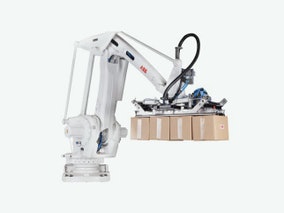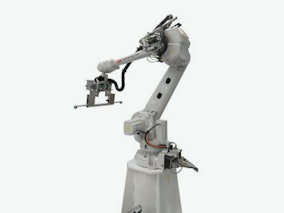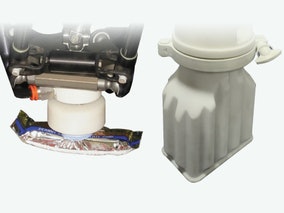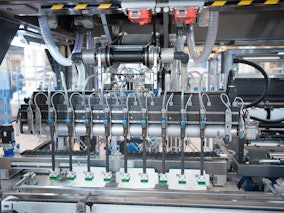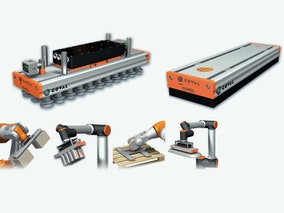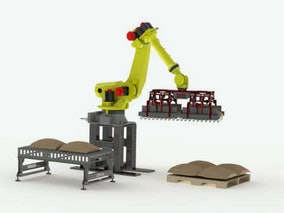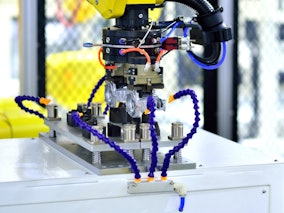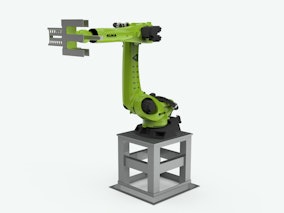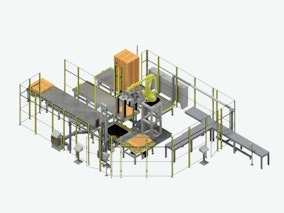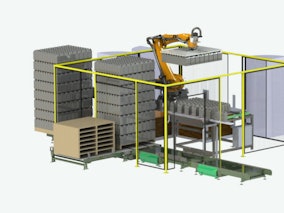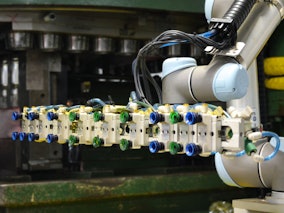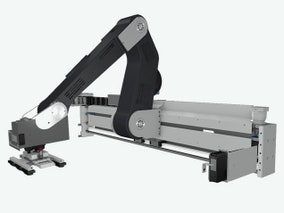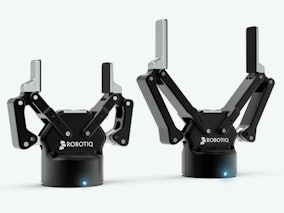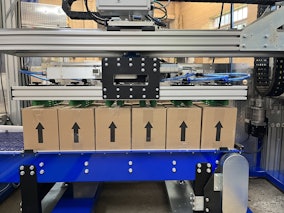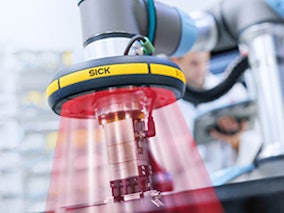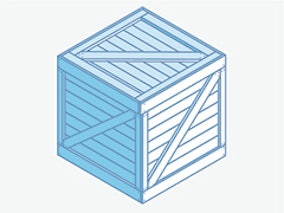Combination End-of-Arm Tooling
(17 companies)Robotic tools that are affixed to a robotic arm that use any combination of air/vacuum, electromagnetic or mechanical tooling.
-

ABB
ABB manufactures end-of-arm tooling for its robotic equipment including three versions of its FlexGripper palletizing gripper for end-of-line applications: the Clamp, which comes in two sizes, is designed for handling cases; the Claw is for heavy-duty, high-speed bag palletizing; and the Vacuum gripper, designed as a plug-and-play extension to the ABB IRB 460 or IRB 660 palletizing robots for cases, can handle 40 kilograms and up to 10 products at the same time.
You are currently not logged in -

B&B Packaging Technologies
Tooling for B&B’s Robotic LEAP (Line Extension Automated Packaging) is custom designed for combination bag/sack packing and case and slip sheet manipulation. LEAP is an innovative development to automate the packaging process of bags and pouches into cardboard boxes. With B&B’s simple user interface and software, no special programming skill-set required to properly configure pack patterns.
You are currently not logged in -

BluePrint Automation (BPA)
BluePrint Automation provides 3-D printed end-of-arm tooling for integration into an existing BPA-supplied robotic end-of-line packaging solution, from concept to production floor in hours. 3-D printed end-of-arm tooling allows for a variety of packaged and naked products to be packed on the same line.
You are currently not logged in -

Cavanna Packaging USA, Inc
Cavanna designs, manufactures and tests its own toolings from its CARTESIO robotics division. End- of-arm tooling (EOT) equipment is tested on a wide installed base, and also on 3D simulation, bench testing and reliability trials. EOT equipment is designed for easy changeover and a recipe-driven approach. Smart tags reduce failures and boost vertical start-ups after any changeover.
You are currently not logged in
-

COVAL Vacuum Technology, Inc.
COVAL develops customized, on-demand vacuum gripper solutions for automated applications in various sectors throughout the production chain in packaging, food processing and plastic processing. From components for vacuum automation to complete grippers for robots, COVAL’s products are used in a range of applications from the individual handling of objects to complete end-of-line layer palletization.
You are currently not logged in -

DMM Packaging, Inc.
DMM Packaging offers end of arm tooling (EOT) with a wide array of end effectors to tackle difficult tasks and increase output without increasing labor. Vacuum and mechanical EOT can be included in the double or single wide Almond Palletizer. EOT on this palletizer can stack quickly without interrupting production, running up to 10 cycles/min. The EOT for this palletizing system helps it successfully achieve repeatable precision stacks.
You are currently not logged in -

DT Engineering
Robotic End of Arm Tooling (EOAT) grippers play a vital role in industrial automation, enhancing the versatility and efficiency of robotic systems. DT Engineering grippers are collaborative subassemblies mounted to the end of a robotic arm, enabling the robot to interact and manipulate objects in various applications. EOAT grippers come in diverse designs, including pneumatic, hydraulic, and electric variants, each tailored to accomplish specific tasks in a variety of environments. From industrial assembly to material handling, DT Engineering’s EOAT grippers are indispensable tools, improving productivity and accuracy in today’s automation-driven industries.
You are currently not logged in -

Greif-Velox America, LLC
Greif-Velox develops and manufactures end-of-arm tooling for robot-based palletizing and depalletizing applications. These tools are designed for handling drums, hobbocks, canisters, sacks, and buckets and are used with 4- to 6-axis robot configurations supporting payloads of up to 400 kg. Their end-of-arm tooling portfolio includes product-specific grippers as well as tools for pallet and cover sheet handling, enabling coordinated palletizing from multiple production lines. The tooling is engineered for compatibility with automated palletizing systems and supports flexible layouts, high-load handling, and consistent placement across a range of industrial packaging environments.
You are currently not logged in
-

Kaufman Engineered Systems
KES manufactures its own end-of-arm tooling for robotic palletizing applications. will configure the customer's KPal palletizer with the most efficient end of arm tooling for the specific product. The KPal V group features our proprietary vacuum style end of arm tooling for conventional sealed corrugated cases. The KPal S group features our spatula style end of arm tooling for bundles or trays. The KPal C group features our clamp style end of arm tooling for bundles, cases or trays. The KPal B group features our bag gripper end of arm tooling for high speed palletizing of bagged product. All end of arm tool styles are available with the ability to pick tier sheets and/or pallets. With a long list of standard and optional features, the KPal Group is sure to increase the rate of return on equipment investment.
You are currently not logged in -

McGinn-Wilkins Automation Inc.
MWA manufactures custom robotic machinery engineered specifically to meet its customers' product demands. MWA's products include end effectors used as tooling for robotic applications in material handling, tote loading and unloading, tray loading, as well as other robotic packaging and palletizing applications.
You are currently not logged in -

ONExia Inc.
ONExia designs and builds custom end-of-arm tooling and grippers for robotic applications that require multiple picks or multi-stage functionality within a single movement.
You are currently not logged in -

Pester USA Inc.
End-arm-tooling from Pester can handle applications ranging from insertion of pallets with filled plastic trays in depalletizers to pick-up of trays and carpules via robotic tray loading. Arms feature position control via camera, including rejection function.
You are currently not logged in
-

ROBOTIQ
Robotiq supplies end-of-arm grippers complementing its collaborative robots that handle a range of applications from assembly and pick and place to quality testing and palletizing. Featured tooling includes the 2F-85 and 2F-140 Adaptive Grippers, designed for “plug and play” applications on cobots for picking parts of different size and shapes. Grippers help to eliminate changeovers and reduce tooling costs. Other grippers offered by Robotiq include the Hand-E Adaptive Gripper for precision assembly and the 3-Finger Gripper for maximum versatility and flexibility in picking up objects of any shape. Robotiq also offers vacuum grippers, sensing and vision grippers, force torque sensors and other tools for cobots.
You are currently not logged in -

ROI Industries Group, Inc.
ROI offers custom-tailored end-of-arm tooling (EOAT) options that are meant to work jointly with its line of PALLETPOD products. ROI’s EOAT products include custom layer grippers, multi-zone layer grippers, mechanical grippers, vacuum grippers, and other options designed to meet palletizing and other business needs while helping companies maximize profits. Optional tool changers can be added to efficiently use multiple EOATs in a single POD.
You are currently not logged in -

SICK, Inc.
SICK’s End-of-Arm Safeguard (EoAS) is designed to elevate robotic safety and compliance without altering existing tooling. This intelligent solution integrates seamlessly at the arm’s endpoint, providing advanced protection for operators and equipment. The system creates a protective field around the robot tool, reduces the risk of crushing injuries, and makes it possible to work safely in the immediate vicinity of the robot. Complementary technologies like PLOC2D for precise part localization and 3D PLB for accurate bin picking further enhance robotic intelligence, enabling safer, smarter, and more productive automation.
You are currently not logged in -

SMC Corporation of America
SMC produces compact and lightweight automation components for robotics applications and end-of-arm tooling. SMC offers a wide variety of products that can be used for handling work pieces of different shapes and materials. For more information on SMC's end-of-arm tooling, visit the website link below.
You are currently not logged in
Report an Issue
Incorrect/inaccurate categorization? Report inaccuracies or problems »
Related End-of-Arm Tooling searches
More on Combination End-of-Arm Tooling
Combination end-of-arm tooling (EOAT) are robotic tools that are affixed to a robotic arm and use any combination of air/vacuum, electromagnetic or mechanical tooling to perform various tasks such as gripping, lifting, and moving objects, as well as assembly, inspection, and packaging. Also referred to as combination end effectors and grippers, combination EOAT are used in a wide range of industries such as manufacturing, packaging, and pharmaceuticals.
Combination end effectors use the most common EOAT technologies in any combination. For example, a combination EOAT might use air/vacuum technology for applications that require the handling of delicate objects such as electronic components or food products. These tools use suction cups or vacuum cups to grip and lift objects. The suction cups create a vacuum that holds the object in place while it is being transported. Air/vacuum EOATs are also used in applications that require the handling of objects with irregular shapes or sizes.
Combination EOAT may also employ electromagnetic technology: the use of magnetic fields to grip and move objects. These tools are commonly used in applications that require the handling of metal objects such as machine parts or steel plates. They are also used in applications that require the handling of heavy objects or objects with irregular shapes.
The mechanical sort uses mechanical grippers, clamps, or fingers to grip and move objects. These tools are commonly used in applications that require the handling of objects with a simple shape such as boxes or containers. This type is also used in applications that require the handling of objects with a high degree of precision such as in the manufacturing of medical devices or aerospace components.
Combination EOATs are designed to combine two or more of these technologies to create a tool that is tailored to a specific application. For example, a combination system may use air/vacuum technology to grip an object and mechanical technology to move it. This allows the tool to handle objects with a high degree of precision while also providing a strong grip.
The design of this tool is critical to its performance. The end effector must be able to grip and move objects with a high degree of precision while also providing a strong and secure grip. The EOAT must also be able to operate in a range of environments and conditions such as high temperatures, humidity, or corrosive environments.
The use of combination EOATs can provide significant benefits to manufacturers. These tools can increase productivity by reducing the time required to handle and move objects. They can also improve product quality by providing a high degree of precision and accuracy in handling objects. They can additionally improve worker safety by reducing the need for manual handling of heavy or awkward objects.
It’s easy to see why combination end-of-arm tools are so important in the facility. These robotic attachments serve various purposes across industries, like grasping, lifting, moving, assembling, inspecting, and packaging on busy plant floors. Combining these tools offers manufacturers advantages like enhanced productivity, better product quality, and improved worker safety. Effective tool design, customized for each application, plays a vital role in their performance.
Here on the PMMI ProSource directory, we have a curated list of trusted combination end-of-arm tooling suppliers and manufacturers, ready to work with you today. Scroll through to find the partner for your next packaging line asset.
